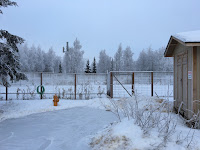 It's tough to look at your garden in the winter. It's covered with snow like a thick down comforter. The hoarfrost makes the fence so fuzzy you can't see through it. The temperature is freezing maybe below zero. You really want to get out there and dig, not in the snow but in the dirt beneath. It's frozen and even a pick-axe will have trouble putting a dent in the soil. It looks lifeless.
It's tough to look at your garden in the winter. It's covered with snow like a thick down comforter. The hoarfrost makes the fence so fuzzy you can't see through it. The temperature is freezing maybe below zero. You really want to get out there and dig, not in the snow but in the dirt beneath. It's frozen and even a pick-axe will have trouble putting a dent in the soil. It looks lifeless.That leaf mold, compost, or yard litter you spread last fall is under the blanket of white. What's happening to it? The critters that break it down in warmer weather are still there. Not only are they there, they are working hard. They work more slowly but they are hard at it making organic matter that will hold the ion nutrients the plants need. The more organic matter the more nutrients. Your garden will thrive and the critters won't be stealing nutrients from you vegetables and flowers.
 Without that cold weather many of our northern plants would not survive or bear fruit. Rhubarb is grown as an annual in the southern US because it doesn't get cold enough for it's winter rest cycle. Many of our fruit trees need at least a specific number of days concurrently near or below freezing (chill hours) to be able to set fruit the following year. People don't grow apples, as a rule, in the southern US for this very reason. Our warming climate may have adverse effects on some of our fruit tree crops in the future. Winter is a time of rest and revitalization for plants that live in the north. Whether it's fruit trees, rhubarb, or flowering bulbs and shrubs without winter many of them would rot in the ground.
Without that cold weather many of our northern plants would not survive or bear fruit. Rhubarb is grown as an annual in the southern US because it doesn't get cold enough for it's winter rest cycle. Many of our fruit trees need at least a specific number of days concurrently near or below freezing (chill hours) to be able to set fruit the following year. People don't grow apples, as a rule, in the southern US for this very reason. Our warming climate may have adverse effects on some of our fruit tree crops in the future. Winter is a time of rest and revitalization for plants that live in the north. Whether it's fruit trees, rhubarb, or flowering bulbs and shrubs without winter many of them would rot in the ground.January is the time most gardeners look forward to the warm spring weather. Most wish they could get out and dig. I have already received gardening catalogs from Harris, Johnny's, Seed Savers Exchange, and Territorial. Most people call these publications seed catalogs. I try not to because most of them cover so much more than just seed. It's refreshing with the snow and the cold to browse through the catalogs dreaming about what might be in the spring and wishing you could plant those "exotics" that just won't grow in your zone.
 Use winter to research that new season extending idea you had last fall. Low tunnels, row tunnels, IRT plastic all can be used to extend the season and coax those exotics to finish their life cycle. If you haven't thought about how to make it happen during the winter you probably won't have time when planting, weeding, harvest, or other season comes around. Use the "slow" winter period to try to make your garden dreams come true with careful research and meticulous planning. Okay maybe not so meticulous but some plan is usually necessary. Make the most of your winter because all too soon you will be busy with the garden and digging in the dirt.
Use winter to research that new season extending idea you had last fall. Low tunnels, row tunnels, IRT plastic all can be used to extend the season and coax those exotics to finish their life cycle. If you haven't thought about how to make it happen during the winter you probably won't have time when planting, weeding, harvest, or other season comes around. Use the "slow" winter period to try to make your garden dreams come true with careful research and meticulous planning. Okay maybe not so meticulous but some plan is usually necessary. Make the most of your winter because all too soon you will be busy with the garden and digging in the dirt.
it was great to see the garden, orchard and working grounds this spring at Assembly. I'm looking foreard to hearing your progress and seeing pictures when available. best wishes from Juneau.
ReplyDeleteLisa. RLC ELCA
Don,
ReplyDeleteThis is Adam Baldwin from the Anchorage Museum. I was on you amazing tour of the garden last fall. I'm conducting a free summer bike tour on the evening of Thursday, June 13th and I would be thrilled if you could meet us at the garden and give us a tour. The bike tours focus on different topics but the one in June is about urban gardening and food security. Please email me if you are available and interested. abaldwin@anchoragemuseum.org or 907.830.7229 (cell). Keep of the great work.